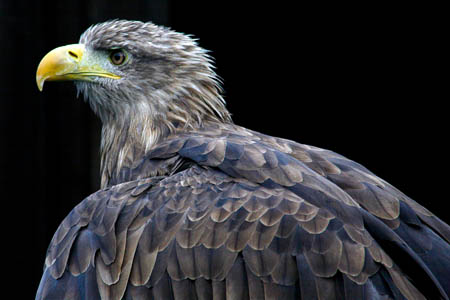Police are appealing to walkers for information to help them after the body of a white-tailed eagle was found on a Scottish estate.
The Tayside force called the incident an ‘absolute disgrace’. The bird was one of 15 donated by Norway to Scotland as part of a reintroduction programme but has been poisoned by banned pesticides. The remains of the bird were found on the Glenogil estate in Angus last summer, but police say they have been carrying out extensive inquiries since then.
Detective Inspector Ally Waghorn, who is in charge of the investigation, said: “It is an absolute disgrace that the use of pesticides to kill what are seen by some as pest species continues in Scotland.
“There is also a real risk to any hillwalker who might encounter and handle poisoned bait. I’d appeal to anyone who has any information about the incident, or any other illegal use of pesticides against wildlife, to contact the police.”
The 15 birds, also known as the sea eagle, were greeted on their arrival in Scotland by environment minister Michael Russell, and the eagle in question was released at a secret location in Fife. White-tailed eagles have been absent from Scotland for 150 years.
A spokesperson for Tayside Police said: “The birds already released as part of this programme have gradually spread throughout Scotland, although mainly keeping to the east coast area, where they are feeding in areas of abundant natural prey.
“Whilst most of the released white-tailed eagles have thrived, there have been several serious incidences of wildlife crime involving this species in Tayside. The poisoned bird is likely to have ingested bait laced with banned agricultural pesticides that were deliberately set out.
“The poisons used have been confirmed after analysis by the Scottish Agricultural Science Agency.”
Anyone with information about the incident is urged to contact Tayside Police on 0300 111 2222 or speak to any police officer. Calls can also be made in confidence to Crimestoppers on 0800 555 111. A contact form is also available on the force’s website.
The Glenogil estate’s owner, multimillionaire John Dodd, was at the centre of a controversy over another poisoning allegation four years ago. The fund manager and his estate manager threatened to sue Tayside Police after they implicated the estate in the case. The police also mounted a series of dawn raids on properties during their investigations.
No-one was found guilty and the landowner has always insisted on his innocence and that of his staff. However, the millionaire had his farming subsidy cut by £107,000 by the Scottish executive under rules that demand protection of wildlife a condition of the payments under strict EU cross-compliance legislation.
- Northern Constabulary has launched an education campaign on wildlife crime for youngsters in its area. The venture, being run with the Royal Zoological Society of Scotland, aims to teach schoolchildren the seriousness of wildlife crime, including egg collecting.
Each school in the Highland region will be offered a chance to send their fourth year pupils to the Highland Wildlife Park at Kincraig, which is owned by the society.
The Force’s wildlife crime co-ordinator, Chief Inspector Paul Eddington said: “It is our intention to educate the adults of tomorrow about the serious impact wildlife crime has on our communities and how seriously the police and our partner agencies treat wildlife crime.”

![[CC-2.0]](/lib/img/layout/cc-attr.gif)
David Dear
20 January 2010Obviously, John Dodd, is an egocentric, rich b*****d along with his collusive, selfish and narrow minded staff. But then he's probably friends with the bastard son of Princess Di and James Hewitt, Harry the Hen Harrier shooter!
Ian Herd
21 January 2010Scum of the earth, some people just dont have any respect, if John Dodd had any respect then the least he could do would be to replace the dead sea eagle and the cost should'nt even come into it, you cant put a price on something like a bird of prey, just seeing them floating on the thermals in the wild is priceless!!!!
Jim Wyllie
21 January 2010These crimes are very difficult to detect and to prove. They mainly occur on grouse shooting estates in Perthshire and Angus. Therefore highly punititive legislation must be passed when an offender is traced. Punishment must include the landowner . On SOME estates it is obvious that staff are only acting on the instructions of the owners.
Imprisonment for the landowner is the only effective answer as many can afford to ignore any financial penalties.
Lindsay Wyllie
21 January 2010To my knowledge thats 3 eagles been poisoned in the Angus Glens recently, 2 sea eagles in Glenogil and a golden eagle in Glenesk. Was on that estate in Glen Esk recently. No predators just industrial game shooting. What an advertisement for visiting the Angus Glens.
Ron Morris
23 January 2010Like many, I find this incident sick and barbaric and all efforts must be made to bring the criminal(s) to justice. I am glad to state that it has been my privilege to have met many members of the shooting fraternity, gamekeepers and land managers, etc, who equally abhor such practices. It is indeed unfortunate that the actions of a few, or perhaps not so few, draws a veil of suspicion over all their peers.
This incident is part of a series of incidents which has turned the once beautiful Angus Glens into the sad Angus Dens (of iniquity!).